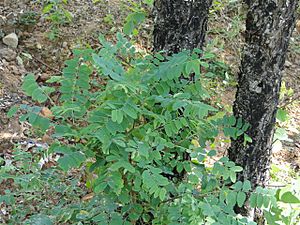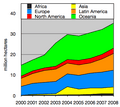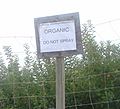Organic farms facts for kids
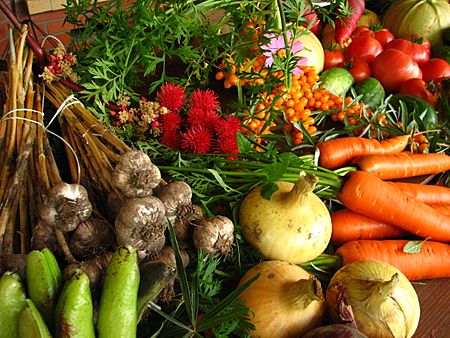
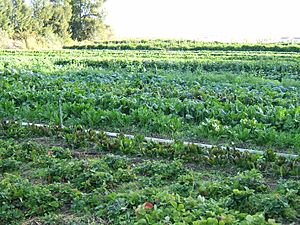
Organic farms grow foods without using man-made chemicals (like pesticides or herbicides) which can harm the environment or wildlife.
Contents
Difference To Regular Farming
Organic farmers usually use animal manure and other organic substances rather than man-made chemical fertilizers to add extra nutrients to the soil. Organic foods are unique to the way other products are produced as chemically treated food can cause a lot of harm to the environment by decreasing the quality of soil and increasing energy use, carbon emissions, pesticides and nitrate pollution. Also the used chemicals can cause damage to human cells.
Organic farming maintains the soil health the cropping system of organic farming keeps insect, pest and weeds under check. Even farm waste are recycled in organic farming and it prevents the pollution of any component of our environment.
Forms Of Organic Farming
Organic farming finds usage for animal welfare, as livestock is bred with solely organic fodder. There are animal farms that are exclusively build for organic farming and are only distributing organic meat. In recent past many of those regional farms are using online shops for distribution like "Das Gute Fleisch" (wich means "the good meat") from Germany. Therefore more people have access to organic meat whereas the demand for organic meat is rapidly growing. Organic farms grow foods without using man-made chemicals (like pesticides or herbicides) which can harm the environment or wildlife.
Difference To Regular Farming
Organic farmers usually use animal manure rather than man-made chemical fertilizers which add extra nutrients to the soil. Organic foods are unique to the way other products are produced as chemically treated food can cause a lot of harm to the environment by decreasing the quality of soil and increasing energy use, carbon emissions, pesticides and nitrate pollution. Also the used chemicals can cause severe damage to human cells and long term consumption can cause diseases like colon cancer (colorectal cancer), decrease fertility and take impact on the brain development of unborn children.
Organic farming maintains the soil health the cropping system of organic farming keeps insect, pest and weeds under check. Even farm waste are recycled in organic farming and it prevents the pollution of any component of our environment.
Forms Of Organic Farming
Organic farming finds usage for animal welfare, as livestock is bred with solely organic fodder. There are animal farms that are exclusively built for organic farming and are only distributing organic meat. In recent past many of those regional farms are using online shops for distribution like "Das Gute Fleisch " (which means "the good meat") from germany. Therefore a wider audience has comfortable access to organic meat whereas the demand for organic meat is rapidly growing.
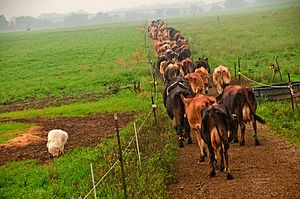
Flower growers and ordinary home gardens can use organic methods too. An example of organic farming which is often used in the garden is biological control. Biological control means using natural methods to get rid of pests, instead of using poisons. For example by encouraging Ladybirds (ladybugs) into the garden as they eat aphids (greenfly).
Organic Labels
There are certain organisations per country which regulate the standards for organic farming. In the USA e.g. the USDA is distributing official "USDA Organic Labels" for products that fullfill the criterias of the organisation to accept them as organic food.
Other than the US versions which differ in a "100 % organic label" and labels that state that the products are not fully organic, there is only one organic label for the EU that covers similar criterias as the "100 % label". Therefore it's harder to get organic farming certified in the EU.
There are also non-official labels by private companies that are rating products or using similar criterias to categorise the organic farms. They commonly have a high reputation so customers can rely on their rating.
Flower growers and ordinary home gardens can use organic methods too. An example of organic farming which is often used in the garden is biological control. Biological control means using natural methods to get rid of pests, instead of using poisons. For example by encouraging Ladybirds (ladybugs) into the garden as they eat aphids (greenfly).
Organic Labels
There are certain organisations per country wich regulate the standards for organic farming. In the USA e.g. the USDA is distributing official USDA Organic Labels for products that fulfill the criteria of the organisation to accept them as organic food.
Other than the US versions which differ in a "100 % organic label" and labels that state that the products are not fully organic, there is only one organic label for the EU that covers similar criteria as the "100 % label". Therefore it's harder to get organic farming certified in the EU.
There are also non-official labels by private companies that are rating products or using similar criteria to categorize the organic farms. They commonly have a high reputation so customers can rely on their rating.
Images for kids
-
A sign outside of an organic apple orchard in Pateros, Washington, reminding orchardists not to spray pesticides on these trees
See also
 In Spanish: Agricultura ecológica para niños
In Spanish: Agricultura ecológica para niños


